
-
 Syria sex abuse survivors need aid, says Nobel winner Mukwege
Syria sex abuse survivors need aid, says Nobel winner Mukwege
-
Spain hosted record 94 mn foreign tourists in 2024

-
 European stocks climb as inflation takes centre stage
European stocks climb as inflation takes centre stage
-
BP nears deals for oil fields, curbs on gas flaring in Iraq

-
 Mozambique inaugurates new president after deadly post-election unrest
Mozambique inaugurates new president after deadly post-election unrest
-
Syrian activists work to avoid return to dictatorship

-
 Beijing 'firmly opposes' US ban on smart cars with Chinese tech
Beijing 'firmly opposes' US ban on smart cars with Chinese tech
-
Equities mixed as US inflation, China data loom

-
 UK inflation dips, easing some pressure on government
UK inflation dips, easing some pressure on government
-
German bourse banks on Trump-fuelled crypto boom

-
 Record 36.8 million tourists visited Japan in 2024
Record 36.8 million tourists visited Japan in 2024
-
German far-right AfD takes aim at Bauhaus movement

-
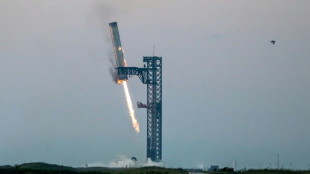 SpaceX set for seventh test of Starship megarocket
SpaceX set for seventh test of Starship megarocket
-
Private US, Japanese lunar landers launch on single rocket
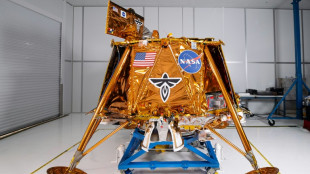
-
 Spanish youth ditch dating apps for 'real life' love
Spanish youth ditch dating apps for 'real life' love
-
Bangladesh's Yunus demands return of stolen billions

-
 Asian equities mixed as US inflation, China data loom
Asian equities mixed as US inflation, China data loom
-
Renewed US trade war threatens China's 'lifeline'

-
 China's economy seen slowing further in 2024: AFP survey
China's economy seen slowing further in 2024: AFP survey
-
Musk, Bezos, Zuckerberg to attend Trump inauguration: report

-
 'We may look easy-going, but...' Canadians veto Trump's merger plan
'We may look easy-going, but...' Canadians veto Trump's merger plan
-
Starbucks shift on non-paying visitors stirs debate in US

-
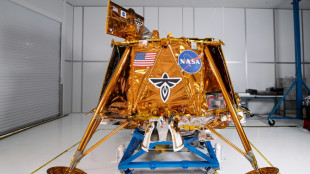 US, Japanese lunar landers set to launch on single rocket
US, Japanese lunar landers set to launch on single rocket
-
Boeing 2024 plane deliveries tumble on labor, safety woes

-
 Argentine annual inflation nosedives, in boost for Milei
Argentine annual inflation nosedives, in boost for Milei
-
Meta to lay off 3,600 employees in performance-based cuts

-
 Mexico hails $5 bn Amazon investment in face of Trump threats
Mexico hails $5 bn Amazon investment in face of Trump threats
-
MSNBC boss leaves ahead of Trump White House return

-
 Panama Canal will 'remain' Panamanian: UN maritime chief
Panama Canal will 'remain' Panamanian: UN maritime chief
-
Amazon orders 200 Mercedes-Benz electric trucks

-
 Amazon to invest over $5 bn in Mexico data center
Amazon to invest over $5 bn in Mexico data center
-
Lindt chocolate to raise prices again this year

-
 UK finance minister, hit by market woes, stands firm on growth
UK finance minister, hit by market woes, stands firm on growth
-
Dozens rescued, 15 bodies pulled from South Africa mine

-
 Ukraine hits Russian army factories, energy hubs in 'massive' barrage
Ukraine hits Russian army factories, energy hubs in 'massive' barrage
-
Queen was not told aide was Soviet spy for years, UK records show

-
 Global road transport emissions to peak in 2025: study
Global road transport emissions to peak in 2025: study
-
NATO launches Baltic Sea patrols after suspected cable sabotage

-
 'Persepolis' author refuses French award over Iran 'hypocrisy'
'Persepolis' author refuses French award over Iran 'hypocrisy'
-
India's Hindu pilgrims: a sea of humanity at Kumbh Mela

-
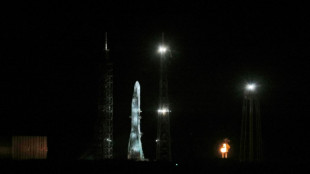 Blue Origin scrubs key test launch again, eyes Thursday
Blue Origin scrubs key test launch again, eyes Thursday
-
North Korea fires short-range ballistic missiles into sea

-
 'Not for the poor': Indonesians in capital face housing, commute woes
'Not for the poor': Indonesians in capital face housing, commute woes
-
Blue Origin eyes early Tuesday launch but weather an issue
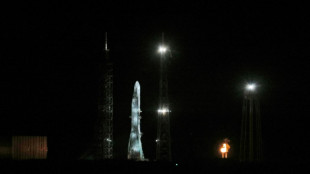
-
 Trump's return threatens resurgence of trade wars
Trump's return threatens resurgence of trade wars
-
Middle East-Based Sigma Capital Unveils $100M Fund to Accelerate Web3 Innovations

-
 Grammys still set for February 2, will support LA fire relief
Grammys still set for February 2, will support LA fire relief
-
Kazakhstan says part of Aral Sea has nearly doubled in volume

-
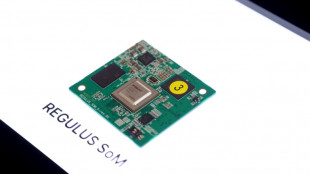 US announces new restrictions on AI chip exports
US announces new restrictions on AI chip exports
-
Relative of Jack the Ripper victim demands new inquest


Beijing 'firmly opposes' US ban on smart cars with Chinese tech
Beijing on Wednesday said it "firmly opposes" a US move to effectively bar Chinese technology from smart cars in the American market, saying alleged risks to national security were "without any factual basis".
"Such actions disrupt economic and commercial cooperation between enterprises... and represent typical protectionism and economic coercion," foreign ministry spokesman Guo Jiakun said, adding: "China firmly opposes this."
Tuesday's announcement in the United States, which also pertains to Russian technology, came as outgoing President Joe Biden wrapped up efforts to step up curbs on China, and after a months-long regulatory process.
The rule follows an announcement this month that Washington is mulling new restrictions to address risks posed by drones with tech from adversaries such as China and Russia.
US Commerce Secretary Gina Raimondo said that modern vehicles contain cameras, microphones, GPS tracking and other technologies connected to the internet.
"Cars today aren't just steel on wheels -- they're computers," she said.
"This is a targeted approach to ensure we keep PRC and Russian-manufactured technologies off American roads," she added, referring to the People's Republic of China.
But Guo slammed the move, telling journalists in Beijing that China would "take necessary measures" to safeguard its legitimate rights and interests.
"What I want to say is that the US, citing so-called national security, has restricted the use of Chinese connected vehicle software, hardware, and entire vehicles in the United States without any factual basis," he told a regular press conference.
"China urges the US to stop the erroneous practice of overgeneralising national security and to stop its unreasonable suppression of Chinese companies."
- 'Trying to dominate' -
The final US rule currently applies just to passenger vehicles under 10,001 pounds (about 4.5 tonnes), the Commerce Department said.
It plans, however, to issue separate rulemaking aimed at tech in commercial vehicles like trucks and buses "in the near future".
For now, Chinese electric vehicle manufacturer BYD, for example, has a facility in California producing buses and other vehicles.
National Economic Advisor Lael Brainard added that "China is trying to dominate the future of the auto industry".
But she said connected vehicles containing software and hardware systems linked to foreign rivals could result in misuse of sensitive data or interference.
Under the latest rule, even if a passenger car were US-made, manufacturers with "a sufficient nexus" to China or Russia would not be allowed to sell such new vehicles incorporating hardware and software for external connectivity and autonomous driving.
This prohibition on sales takes effect for model year 2027, and also bans the import of the hardware and software if they are linked to Beijing or Moscow.
Y.Tengku--CPN
